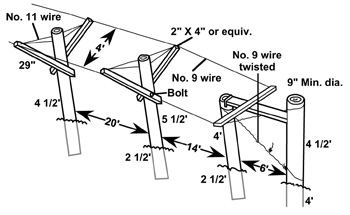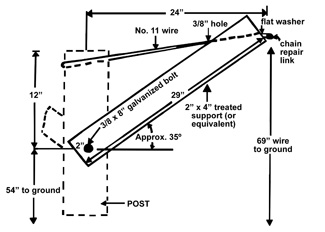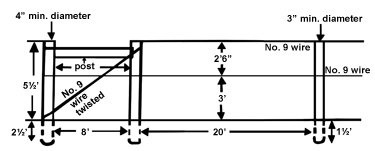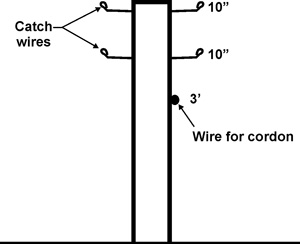From
the University of Georgia Cooperative Extension
College
of Agriculture and Environmental Sciences
Grape
Trellis Systems
Excerpts from the Home Garden Bunch Grapes
publication
American Type
Bunch Grapes
American
type bunch grapes are vigorous and have a trailing, downward growth
habit. Three high trellis systems are commonly used to train home
garden American type bunch grapes in the south: the double curtain (two
wire horizontal system), the two wire vertical and the single wire. The
top wire is typically 5 feet to 5 1/2 feet above ground level in
all three systems.
The Double
Curtain Trellis
— This trellis system is usually the most desirable of the three
systems because of increased yields. The trellis system has two wires 4
feet apart and 5 1/2 feet above the ground. Fig. 1 and Fig. 2 show
details of how to construct the double curtain trellis. A simple T-bar
trellis constructed from treated 4" x 4" posts can also be used.

|
 |
Fig.
1
Details for the double curtain trellis
|
Fig. 2
Details of the double curtain support system |
The
Two Wire Vertical Trellis —
The two wire vertical trellis used for the four-arm Kniffin training
system is considerably less expensive to construct than the double
curtain trellis. However, shading of the foliage on the lower fruiting
canes by the upper canes reduces the quality and productivity of the
grapes on the lower wire. Fig. 3 illustrates the construction of the
two-wire vertical trellis. The primary use for this trellis is in
situations where space is limited, but where there is good direct sun
exposure. If direct sun exposure is limited, use the double curtain or
single wire trellis.
 |
Fig. 3
Dimensions of a two-wire vertical trellis (four-arm Kniffin), showing
end braces |
Single Wire
High Trellis
— This trellis is recommended where diseases are a problem. The
vines dry off more rapidly after a rain on the single wire. Space the
vines 10 feet apart when using this trellis. Yields are lower than the
other two systems, but construction is easy. Construct end supports as
shown in Fig. 3.
French Hybrid
and European Bunch Grapes
 |
Fig. 4
Detail
for constructing the single low trellis with catch wires. View
looking down the row. Special nails or a bend nail can be used for the
catch wire |
Single Wire
Low Trellis with Catch Wires (AKA Low Trellis Cordon System)
— Most American bunch grapes do not grow upright. However, hybrid and
European bunch grapes have new shoots that naturally grow upward. Two
removable catch wires above the cordons (arms) further encourage this
growth habit and allow good exposure of the fruit to sunlight and
fungicide sprays. The low-trellis cordon system establishes the cordons
3 to 3.5 feet above the ground and
includes two removable catch wires positioned at 10 inch intervals
above the cordon wire. This system promotes vertical growth, resulting
in a narrow, upright vertical canopy. (Fig. 4). Thus, looking down the
row, the tucked upright shoots look like a consistent hedgerow of
foliage that is growing above the low-positioned cordon.
Further Reading
Home Garden Bunch Grapes,
University of Georgia, Cooperative Extension pdf
Training Young Vines,
University of Georgia, Cooperative
Extension
Pruning
the Bearing Vine, University of
Georgia, Cooperative Extension
Back
to
Bunch Grape Page
Pruning and
Training Page
|
|
Bibliography
Krewer, Gerard. "Home Garden Bunch Grapes."University
of Georgia, Cooperative Extension,
Published with Major Revisions 15 Oct. 2006, Minor Revisions 5 Jan. 2010, Full Review 1 Jan. 2014, Minor Revisions 13 June 2017,
extension.uga.edu/publications/detail.html?number=B807&title=Home%20Garden%20Bunch%20Grapes. Accessed 10 Oct. 2018.
Published 7 Nov. 2014 LR. Last update 10 Oct. 2018 LR
|



